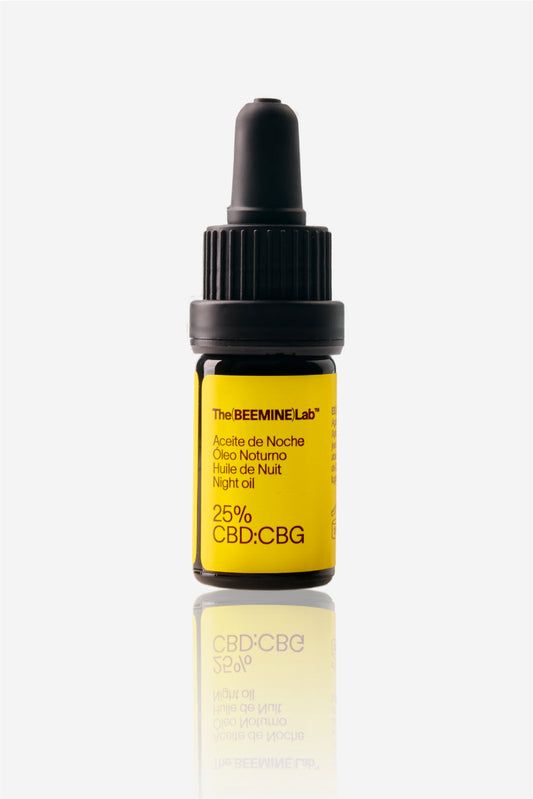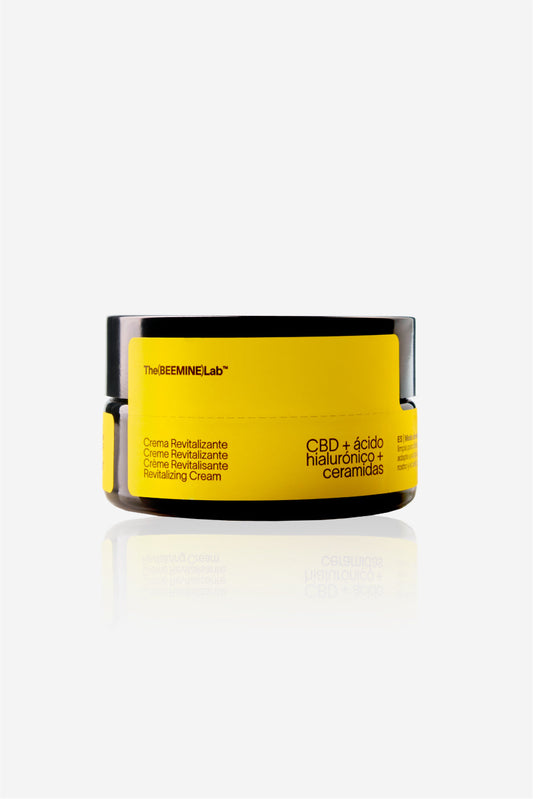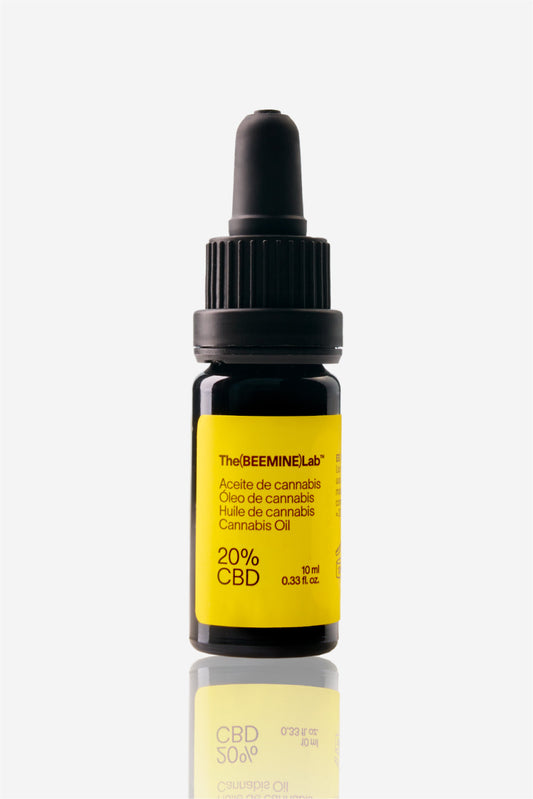How to use CBD oil on our pets?
The organism of dogs and cats has functions very similar to those of the human body, including the endocannabinoid system , which is common to the vast majority of existing animals (1-2). Thanks to the presence of the endocannabinoid system, pets will notice effects very similar to those of humans, especially at a therapeutic level, since the endocannabinoid system is responsible for maintaining the psycho-physical balance of both the human and animal organism . In the case of pets, the most effective way to administer CBD is through the internal route, using oils and edibles (not regulated in the EU) that allow its ingestion, although it is also possible to act externally in specific situations. (8) However, unlike humans, pets are much more sensitive to phytocannabinoids , so in the veterinary field, dosage must be carefully monitored (especially if THC is used) to avoid possible unwanted side effects, in addition to using only controlled and analyzed products. (3-4-5-6-7)What benefits does CBD have for pets?
Thanks to the similarity in the functioning of the endocannabinoid system, animals can benefit from the therapeutic properties of CBD recognized in humans , proving very useful in the treatment of different diseases, especially those involving inflammation and pain such as rheumatic problems and those with a neurological origin such as epilepsy or behavioral problems.Thanks to the presence of the endocannabinoid system, pets will notice effects very similar to those of humans, especially at a therapeutic level.Although direct and specific scientific evidence for dogs and cats is still limited, there is a lot of evidence related to other types of animals and humans; in addition, there is a lot of evidence at the clinical and experiential level, essential to be able to direct scientific research towards the diseases that best respond to treatment with CBD oil . (9-10)

Anxiety
Pets can suffer from anxiety problems in a different way than humans, since they lack the more properly rational psychological problems, although they are also related to some emotional trauma such as abandonment or with the primary needs of survival , such as not having regular food or having been the victim of a physical attack by another animal or a human being. With pets, it is essential to carry out specific psychological work, although it is possible to alleviate the symptoms and allow an improvement in the animal's well-being through a natural treatment such as CBD oil. Thanks to the ability to modulate serotonin 5-HT1a receptors, CBD has widely recognized relaxing and anxiolytic properties that allow its therapeutic use in different psychiatric diseases. (11) In addition, the activity on CB1 cannabinoid receptors allows to improve the emotional regulation characteristic of post-traumatic stress. Although clinical evidence shows significant therapeutic effects on anxiety in pets , there is only one study with dogs that shows a possible reduction in aggression towards humans after treatment with CBD oil. (12)Seizures and epilepsy
The benefits of CBD as an antiepileptic are known and recognized around the world (13) , for this reason a drug with CBD has been developed , effective especially for drug-resistant childhood epilepsies. (14) The very promising results in humans have stimulated research in animals, with promising results: some studies have shown a reduction in epileptic seizures in dogs after the use of CBD oil, finding better results when using a combination of CBD and CBDa. (15-16)Chronic inflammation and general pain
Another area in which cannabis in general (both THC and CBD) is often used is to mitigate symptoms and pathological processes that involve inflammatory mechanisms of both acute and chronic types that are accompanied by pain, especially of neuropathic origin. (20) Thanks to the action on the endocannabinoid receptors CB1, CB2 and TRPV , CBD helps regulate the body's inflammatory mechanisms, in addition to offering pain relief, being particularly useful as a treatment for rheumatic problems such as arthritis and osteoarthritis. It is common for pets to suffer from joint problems , either due to old age, overweight or genetic predisposition, so they could benefit from the analgesic and anti-inflammatory effects of CBD, as is evident in clinical practice. (17) There is a very complete study that has shown significant improvement of symptoms in dogs with osteoarthritis that, thanks to treatment with CBD oil, have been able to suffer from less pain and increase physical activity (18) ; however, there are studies that have not been able to reveal any improvement. (19)Autoimmune diseases
Thanks to the ability to regulate the functioning of our immune system, CBD can be very useful in case of suffering from an autoimmune disease or in tumor processes, since its effect helps to inhibit pathological mechanisms and promote the effectiveness of our defense system. (21)Cardiovascular health
In the circulatory system, the most obvious effect of CBD is vasodilation , in addition to facilitating a decrease in blood pressure. In general, CBD can promote, in both humans and animals, the maintenance of good cardiovascular health , although in pathological situations a direct therapeutic effect has not yet been described and, in addition, in cases of suffering from heart problems it could be counterproductive. On the other hand, the effect of CBD is very important in cases of vascular accidents that can cause ischemia: in these cases, CBD can reduce oxidative damage caused by lack of oxygen , help maintain the functionality of the affected area and optimize regenerative processes. (22)How to choose a good CBD oil for our pets?
The most important aspect to consider when choosing a good CBD oil is the quality of the product and its safety, so it has to be analyzed in detail and produced with rigorous and safe methods, in addition to using high-quality CBD. Regarding the characteristics of the oil, there are products that, in addition to CBD, are enriched with other ingredients such as salmon oil , which can provide additional benefits. Finally, broad-spectrum oils that also retain other phytocannabinoids may be more effective than oils containing only CBD, although the latter allow for greater standardization.What is the ideal dosage of CBD oil?
For internal use, considering that animals are generally smaller than humans and therefore much more sensitive to phytocannabinoids, it is important to use low or medium concentration oils (5%-10%) . It is advisable to start with a few drops divided into two daily doses, gradually increasing until the effects can be observed . In studies on safety and toxicity, dosages from 2 mg to 12 mg per kg of weight per dose have been used. (5-6-7-8) Regarding external use, it is possible to use a specific product or a very low concentration oil (0.5%-3%), applied a couple of times a day to the affected area.Is CBD oil legal for pets?
The legal status of CBD oil is the same for humans and animals, so in the European Union only cosmetic oils are currently regulated . However, many imported oils are used in the country of origin (sometimes in the EU itself) as a food supplement and there are hundreds of CBD products specifically for pets in the world, such as biscuits or food. Literature:- https://www.projectcbd.org/es/pelos-y-patas-medicina-de-cannabis-para-pets
- Silver RJ (2019). The Endocannabinoid System of Animals. Animals : an open access journal from MDPI , 9 (9), 686. https://doi.org/10.3390/ani9090686
- De Briyne, N., Holmes, D., Sandler, I., Stiles, E., Szymanski, D., Moody, S., Neumann, S., & Anadón, A. (2021). Cannabis, Cannabidiol Oils and Tetrahydrocannabinol-What Do Veterinarians Need to Know?. Animals : an open access journal from MDPI , 11 (3), 892. https://doi.org/10.3390/ani11030892
- Brutlag, A., & Hommerding, H. (2018). Toxicology of Marijuana, Synthetic Cannabinoids, and Cannabidiol in Dogs and Cats. The Veterinary clinics of North America. Small animal practice , 48 (6), 1087–1102. https://doi.org/10.1016/j.cvsm.2018.07.008
- Kulpa, JE, Paulionis, LJ, Eglit, GM, & Vaughn, DM (2021). Safety and tolerability of escalating cannabinoid doses in healthy cats. Journal of feline medicine and surgery , 23 (12), 1162–1175. https://doi.org/10.1177/1098612X211004215
- Vaughn, D.M., Paulionis, L.J., & Kulpa, J.E. (2021). Randomized, placebo-controlled, 28-day safety and pharmacokinetics evaluation of repeated oral cannabidiol administration in healthy dogs. American journal of veterinary research, 82(5), 405–416. https://doi.org/10.2460/ajvr.82.5.405
- Chicoine, A., Illing, K., Vuong, S., Pinto, K.R., Alcorn, J., & Cosford, K. (2020). Pharmacokinetic and Safety Evaluation of Various Oral Doses of a Novel 1:20 THC:CBD Cannabis Herbal Extract in Dogs. Frontiers in veterinary science , 7 , 583404. https://doi.org/10.3389/fvets.2020.583404
- Bartner, L.R., McGrath, S., Rao, S., Hyatt, L.K., & Wittenburg, L.A. (2018). Pharmacokinetics of cannabidiol administered by 3 delivery methods at 2 different dosages to healthy dogs. Canadian journal of veterinary research = Revue canadienne de recherche veterinaire , 82 (3), 178–183.ç
- Lima, TM, Santiago, NR, Alves, E., Chaves, D., & Visacri, MB (2022). Use of cannabis in the treatment of animals: a systematic review of randomized clinical trials. Animal health research reviews , 23 (1), 25–38. https://doi.org/10.1017/S1466252321000189
- Yu, C., & Rupasinghe, H. (2021). Cannabidiol-based natural health products for companion animals: Recent advances in the management of anxiety, pain, and inflammation. Research in veterinary science , 140 , 38–46. https://doi.org/10.1016/j.rvsc.2021.08.001
- Crippa, JA, Guimarães, FS, Campos, AC, & Zuardi, AW (2018). Translational Investigation of the Therapeutic Potential of Cannabidiol (CBD): Toward a New Age. Frontiers in immunology , 9 , 2009. https://doi.org/10.3389/fimmu.2018.02009
- Corsetti, S., Borruso, S., Malandrucco, L., Spallucci, V., Maragliano, L., Perino, R., D'Agostino, P., & Natoli, E. (2021). Cannabis sativa L. may reduces aggressive behavior towards humans in shelter dogs. Scientific reports , 11 (1), 2773. https://doi.org/10.1038/s41598-021-82439-2
- Zaheer, S., Kumar, D., Khan, M.T., Giyanwani, P.R., & Kiran, F. (2018). Epilepsy and Cannabis: A Literature Review. Cureus , 10 (9), e3278. https://doi.org/10.7759/cureus.3278
- Huntsman, R.J., Tang-Wai, R., & Shackelford, A.E. (2020). Cannabis for Pediatric Epilepsy. Journal of clinical neurophysiology: official publication of the American Electroencephalographic Society , 37 (1), 2–8. https://doi.org/10.1097/WNP.0000000000000641
- McGrath, S., Bartner, L.R., Rao, S., Packer, R.A., & Gustafson, D.L. (2019). Randomized blinded controlled clinical trial to assess the effect of oral cannabidiol administration in addition to conventional antiepileptic treatment on seizure frequency in dogs with intractable idiopathic epilepsy. Journal of the American Veterinary Medical Association , 254 (11), 1301–1308. https://doi.org/10.2460/javma.254.11.1301
- Garcia, GA, Kube, S., Carrera-Justiz, S., Tittle, D., & Wakshlag, JJ (2022). Safety and efficacy of cannabidiol-cannabidiolic acid rich hemp extract in the treatment of refractory epileptic seizures in dogs. Frontiers in veterinary science , 9 , 939966. https://doi.org/10.3389/fvets.2022.939966
- RC Coelho, MP, de OP Leme, F., A Moreira, F., EMT Branco, S., M Melo, M., & G de Melo, E. (2021). Current review of hemp-based medicines in dogs. Journal of veterinary pharmacology and therapeutics , 44 (6), 870–882. https://doi.org/10.1111/jvp.13016
- Gamble, LJ, Boesch, JM, Frye, CW, Schwark, WS, Mann, S., Wolfe, L., Brown, H., Berthelsen, ES, & Wakshlag, JJ (2018). Pharmacokinetics, Safety, and Clinical Efficacy of Cannabidiol Treatment in Osteoarthritic Dogs. Frontiers in veterinary science , 5 , 165. https://doi.org/10.3389/fvets.2018.00165
- Mejia, S., Duerr, FM, Griffenhagen, G., & McGrath, S. (2021). Evaluation of the Effect of Cannabidiol on Naturally Occurring Osteoarthritis-Associated Pain: A Pilot Study in Dogs. Journal of the American Animal Hospital Association , 57 (2), 81–90. https://doi.org/10.5326/JAAHA-MS-7119
- Aviram, J., & Samuelly-Leichtag, G. (2017). Efficacy of Cannabis-Based Medicines for Pain Management: A Systematic Review and Meta-Analysis of Randomized Controlled Trials. Pain physician , 20 (6), E755–E796.
- Nichols, J.M., & Kaplan, B. (2020). Immune Responses Regulated by Cannabidiol. Cannabis and cannabinoid research , 5 (1), 12–31. https://doi.org/10.1089/can.2018.0073ç
- Kicman, A., & Toczek, M. (2020). The Effects of Cannabidiol, a Non-Intoxicating Compound of Cannabis, on the Cardiovascular System in Health and Disease. International journal of molecular sciences , 21 (18), 6740. https://doi.org/10.3390/ijms21186740







